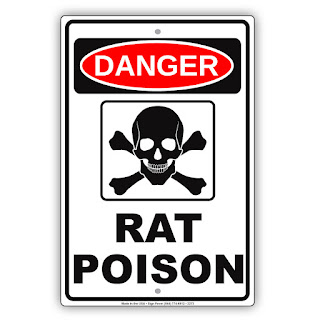Dangers of Rat Poison Usage
The Pest Control Association of Nigeria (PECAN) has called on Nigerians to be cautious using rodenticides (rat poisons) as rodents control measure in their buildings and vicinity, especially in the wake of the Lassa fever outbreak which has made rodents control more pertinent.
According to Dr. Kehinde Kembonta of the Department of Zoology, University of Lagos, pests are organisms found in the wrong place at a particular time. They are destructive and unwanted organisms that are harmful to plants and animals. Included in this category are rodents, fungi, nematodes, weed, bacteria, and mycotoxins.
To rid a property of rats as quickly as possible, homeowners may take drastic measures to eliminate the problem. While poison may get rid of the immediate rat problem, it can lead to more severe issues, including these six dangers:
- Rotting carcasses in walls: Often, rats build nests inside your walls. These areas are a “safe space” for rodents, and it’s where they’ll return to die after ingesting poison. Having a dead family or colony of rats rotting inside your walls can cause your home to stink for days, if not weeks.
There’s also a significant health hazard associated with having decomposing rats in your house.
- Bleeding rats around your home: Some well-known rat poisons in Nigeria cause a rat to bleed out, which can happen before a rat makes it back to a nest. As a result, you may wake up to find dead, bloody rats at random places in your home.
- Health hazards from toxic materials in your home: Keep in mind that a material designed to kill a rat is not exactly healthy for humans. The poison from rat traps can make its way to various surfaces in your home, posing a risk to your health.
- Risks to children: Kids can get their hands on anything, including rat poison. No matter how careful and diligent you are, having these chemicals around your family is not worth the risk. According to Scientific American, rat poison endangers 10,000 children in the United States every year.
The biggest dangers are present in homes with children under six years old due to the natural tendency of “exploration” at this age.
- Risks to pets: Like children, pets are prone to exploring areas where they don’t belong. Further, your pet may come in contact with the rats, either in passing or through ingesting one during a nocturnal hunting session. Even if your pet doesn’t get into the poison directly, accidental contact can be lethal.
- Kills wildlife: Even though a single dose of poison is enough to kill the rat, death is not instantaneous. Instead, the rodent continues munching on its poison-laden feast. By the time the rat finally keels over, it has an enormous toxic load in its system, and if another animal ingests the rat, that animal is now in danger.







Comments
Post a Comment